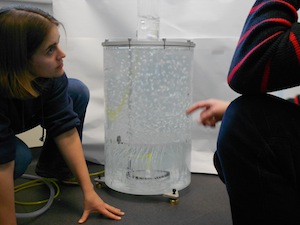[The Laboratory for Geophysical Flows no longer exists]
The Laboratory for Geophysical Flows is a physical space within the Department of Earth Sciences that hosts experiments on the flow of mass and heat, phase changes, and other processes that are relevant to the Earth. The lab is a space for collaboration: it welcomes geologists, geophysicists, applied mathematicians, and students. Our goal is not to create "scale models" of terrestrial processes (dynamical scaling is usually impossible anyway), but rather to design and build simple experiments that are analogues for terrestrial processes, and that can be conveniently observed and measured. By developing our physical intuition for the processes active in experiments, we are better able to produce insight into geophysical processes in Nature. Mathematical theory developed to describe the laboratory analogue system can then be extended to generate quantitative, testable hypotheses about the Earth.
better able to produce insight into geophysical processes in Nature. Mathematical theory developed to describe the laboratory analogue system can then be extended to generate quantitative, testable hypotheses about the Earth.
The lab is also intended as a teaching space; in particular, we will use a rotating table (with co-rotating camera) for demonstrations of fluid mechanics involving the Coriolis force. Many important oceanographic and atmospheric flows are in this category.
